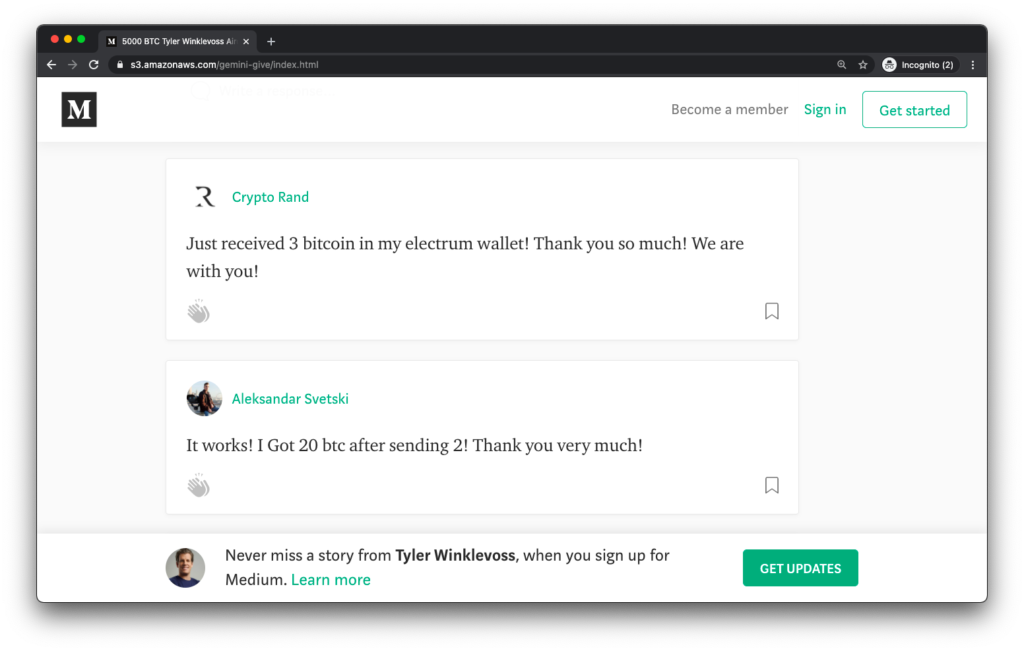Bitcoin giveaway scams pivot from Musk to Chamath, Winklevoss twins

It’s 2021, and Bitcoin scammers are pivoting from pretending to be your dad’s billionaire Elon Musk and instead opting for alternative millennial favorites like Chamath Palihapitiya.
Indeed, a deep web of Bitcoin-hungry Twitter bots are leveraging the booming popularity of Social Capital’s Palihapitiya to reboot the Musk giveaway scam under a fresh guise.

Similar to the Musk iteration, Chamath-themed Twitter accounts tweet dodgy links to blogs promising free Bitcoin, but only if you send some cryptocurrency to a malicious address first.
The blogs navigate to a QR code and instructions to send “small amount you want multiplied by the promotion from your wallet. For example, to get 10 BTC, send 1 BTC.”

The idea is these billionaires are so hepped up on billionaire juice they simply must give away millions of dollars worth of Bitcoin to anyone who sends them crypto.
There’s also a version featuring the Bitcoin bullish Winklevoss twins, and they seem connected.
Some of the accounts that interact with the Chamath tweets also like and share GIFs of the Winklevoss twins promoting a similar 5,000 BTC giveaway.

- The Chamath version appears more successful than the Winklevoss play, with the associated Bitcoin address sitting on 1.57 BTC ($60,000) across 16 transactions.
- The Winklevoss twins version has received just 0.128 BTC, valued at just under $5,000 at press time.
- Both addresses first became active in the past two days.
Curiously, the Winklevoss scam is hosted on Amazon Web Services while the Chamath scam is on Blogspot. This could indicate intent to keep at least one operation online if the other gets taken down.

[Read more: We figured out how much power Elon Musk holds over Dogecoin]
Chamath is a Bitcoin favorite
Twitter’s problem with Bitcoin scammers caught mainstream media attention last year when hackers tweeted malicious links from accounts of over a dozen celebrities — including Barack Obama, Kanye West, and Jeff Bezos.
During the siege, Bitcoin addresses shared by the hacked accounts netted around 12 BTC, a $120,000 haul back then but today valued at nearly half a million dollars.
Overall, blockchain investigators Scam Alert last year estimated the Musk Bitcoin scam had defrauded up to $50 million from Bitcoin holders since 2016.

However, it’s unclear whether these recent transactions truly represent victims as fraudsters often send crypto to themselves to lure their marks.
Already, some frustrated Bitcoin fans have tried reporting the problem to Twitter, but have so far faced technical problems.
So, if you do come across one of the botnet’s tweets, it might help to tag @TwitterSupport if you’re unable to report them directly.
Update Feb 5 2021, 17:47 UTC: New evidence has surfaced linking this Chamath giveaway scam to a much larger Bitcoin phishing campaign that’s netted nearly $6 million in the past 6 months.
Find Protos’ analysis of the “motherload” giveaway scam address here.
Update Feb 12 2021, 08:38 UTC: We published a third analysis of the campaign after the Motherload address recently earned $1 million in one week.
